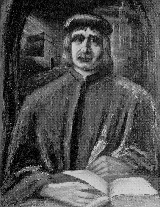
Francis Skaryna,
Preface to the book of Esther the Queen. Prague 1519
 |
For we are born into this world not only for ourselves, but rather to serve God and
the common wealth Francis Skaryna, |
Franciszak Skaryna, a leading Renaissance scholar and humanist, was borne in the north Belarusian city of Polack on the river Dzvina. in 1486. His father, Lukasz, was a merchant.
After leaving his native city as a youth, Skaryna matriculated at the arts faculty of Cracow university, and in 1504 he graduated as a Bachelor of Arts. He evidently pursued his studies with some success for in 1509 he was filling a post of Secretary to Jan, King Of Denmark, at his Court in Copenhagen. From thence he traveled from Germany to Italy, and in 1512 he took Doctor's degree in medicine at Paddua University.
Little is known of Skaryna's life from 1512 to 1517, but it is surmised that he devoted the years to the study of the techniques of printing and engraving, possibly in Venice, Nuremberg, and Ausburg. He must also have begun to prepare his monumental work, the translation of the Bible, the greater part of which he printed and published in Prague from 1517-19. Skaryna then returned to Vilna where from 1525-27 he published the Acts of the Apostles, the Epistles, and a collection of prayers entitled Malaja Padarozhnaja Knizhica(Little Itinerary Book). Some time after completing his work he is thought to have visited Moscow, though as a "heretic Lithuanian" he was given a poor welcome by the authorities and the Muscovites publicly burned his books.
A series of family lawsuits in Vilna and Poznan', and a disastrous fire, which is said to have destroyed his printing press, brought about a decline in Skaryna's fortunes. In 1530 he accepted an appointment as Court physician to Koenigsberg to Albreicht, Duke of Prussia, who thought very highly of him. He sojourn was of short duration, however, for he soon returned to Vilna and became the physician and secretary to Catholic Bishop, Jan. At the end of his life he accepted the offer of a post as Royal Gardener to Ferdinand Hapsburg, King of Bogemia and is reputed to have laid out the botanical gardens in Prague. There he died in or about the year 1540.
Skaryna occupies an important place in the history of Belarusian culture, and his influence has endured through the centuries. He was a truly universal spirit of the Renaissance, and his intellectual interests embraced theology, linguistics, literature, poetry, art, law, medicine, botany, and printing. His great achievements were his monumental translations of the Bible, together with composition of a number of prefaces or philosophical essays, and his delicate wood engravings, which must rank with the best works of the South German School of that period. He has become for the Belarusian people a symbol of antiquity and excellence of their cultural traditions, combining into one harmonious whole the currents of Western and Eastern European civilization.
Guy De Picarda
 This file is a part of
the Virtual Guide to Belarus - a collaborative project
of Belarusian scientists and professionals
abroad. VG brings you the most extensive compilation of the information about Belarus on
the Web.
This file is a part of
the Virtual Guide to Belarus - a collaborative project
of Belarusian scientists and professionals
abroad. VG brings you the most extensive compilation of the information about Belarus on
the Web.
Please send your comments to the authors of VG to
Belarus
History | Statehood | Culture | Law and
Politics | Cities | Nature and Geography |
©1994-04 VG to Belarus
Disclaimer